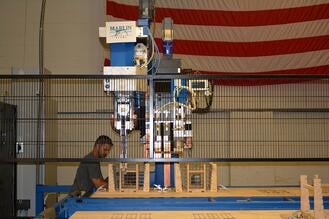 The world of manufacturing has been forever changed.
The world of manufacturing has been forever changed.
Many years ago, manufacturers relied primarily on manual labor for tasks such as shaping and welding metal forms. In the old days, injuries were common, and working conditions were frequently unhealthy, with workers crammed into small, dark, dingy spaces.
However, working conditions are not what they once were in the early days of the industrial revolution.
Nowadays, modern manufacturers in the U.S. use much safer manufacturing practices. Many of the more dangerous and physically-demanding manufacturing tasks are no longer done by hand. Instead, these tasks are now frequently performed by automated manufacturing equipment.
For example, Marlin Steel now handles many welding tasks by using an advanced Medium Frequency Direct Current automated welding robot from IDEAL Systems rather than using handheld welding tools.
The use of a manufacturing robot for welding tasks allows workers to take a supervisory role that keeps them out of reach of danger. This reduces burn injuries among human workers dramatically, and even helps to prevent vision damage from repeated up-close exposure to the flash of a welding torch.
With the change in working conditions, there has also come a change in the requirements for a manufacturing job. Let’s take a look at some of the requirements for a job as a welding machine operator at Marlin Steel to see how things have changed. Watch this amazing piece of machinery in action below!
Educational Requirements
Math skills, especially geometry, have always been a solid job requirement for manufacturing employees looking to start a career in welding metal. The ability to use basic measuring tools to check the dimensions of an object and the angle of a bend in metal have likewise long been crucial to welding work as a means of verifying quality.
However, the introduction of factory automation calls for manufacturing employees to learn a bevy of new skills compared to their predecessors.
At a minimum, many manufacturers now require their employees to have achieved a high-school diploma or GED. According to information from the Bureau of Labor Statistics, “49.5% of welding, soldering, and brazing machine setters, operators, and tenders” have a high-school diploma or equivalent educational qualification.
For example, Marlin Steel requires automated welding machine operator and supervisor applicants to have the following:
- Knowledge of arithmetic, algebra, and geometry, as well as their applications.
- The ability to understand specifications, drawings, and all other disciplines related to project and engineering documentation.
- Mechanical knowledge of machines and tools.
Thanks to the introduction of factory automation tools, manufacturing is now more focused on cerebral work such as planning, creating design documents, and programming.
Going Beyond Basic Education
 Aside from basic math skills and a high-school level education, operating a computer-controlled welding machine successfully takes several other qualities and skills.
Aside from basic math skills and a high-school level education, operating a computer-controlled welding machine successfully takes several other qualities and skills.
For example, a welding machine operator needs to have sufficient computer skills to program the welding machine. Another hard skill the operator should have is a working knowledge of how different metal alloys react to the welding machine, which is often something operators pick up on the job.
Beyond the hard skills, a great welding machine operator will also have certain soft skills, including:
- Communication Skills. A good welding machine operator can follow directions to the letter. A great welding machine operator communicates with the rest of the team to optimize the manufacturing process and find solutions to production challenges.
- The Drive to Constantly Learn More. Learning doesn’t stop once you leave the classroom. There are always new manufacturing processes and equipment being created, and the best welding machine operators keep their knowledge up to date so that they can use these new tools.
- A Dedication to Safety. Workplace safety incidents create production delays and can cost employees their health. Welding machine operators need to be able to operate the factory equipment safely and make sure that safety hazards are identified and taken care of before an incident occurs.
These are just a few of the qualities that Marlin Steel looks for in a welding machine operator. However, the rewards for being a part of the manufacturing industry are well worth the effort. These jobs are solid middle class jobs that provide a living wage for workers, not minimum-wage dead-ends that pay less than poverty-line annual salaries.
Want to know more about what it takes to start a career in manufacturing? Check out Marlin Steel’s careers page today!


.gif)


